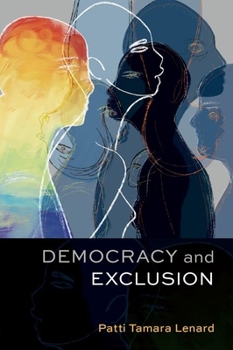Democracy and Exclusion
As people become more mobile around the world, the nature of citizenship, and all its attendant rights, has become the object of intense scrutiny. And, as we know, democracies forcefully and coercively exclude those whom they believe do not belong on their territory or among their constituency. In Democracy and Exclusion, Patti Tamara Lenard looks at how and when democracies exclude both citizens and noncitizens from territory and from membership to determine if and when there are instances when such exclusion is justified. To make her case, Lenard draws on the all-subjected principle, or the idea that all those who are the subject of law--that is, those who are required to abide by the law and who are subject to coercion if they do not do so voluntarily--should have a say in what the law is. If we assess who is subjected to the power of a state at any particular moment, and especially over time, we can see who ought to be treated as a member and therefore be granted citizenship or the right to stay. With an in-depth look at instances in which democratic states have expanded or adopted policies that permit the exclusion of citizens--including denationalization, stateless peoples, labor migrants, returning foreign fighters, and LGBTQ+ refugee resettlement--Lenard argues that admission to territory and membership is either favored by, or required by, democratic justice. Democracy and Exclusion makes a powerful case that subjection to the power of a state, without proper protection from exclusion, is a violation of democratic principle.
Format:Hardcover
Language:English
ISBN:0197585817
ISBN13:9780197585818
Release Date:July 2023
Publisher:Oxford University Press
Length:232 Pages
Weight:1.01 lbs.
Dimensions:0.8" x 6.4" x 9.3"
Customer Reviews
0 rating





